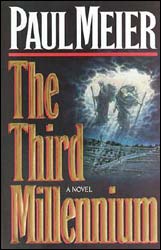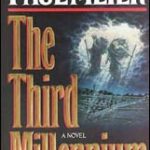Learning From Bad Books, Part 1
“The whole world is turning into scrambled eggs.” Larry marched to the window.
[…] Jimmy pointed out the window. “Do you notice something strange? Several cars have driven off the road and been abandoned there on Pacific Coast Highway and Avocado, causing several fender benders.”
Those are actual quotes from a certain end-times novel from last decade (pages 47 and 48). The Rapture has just happened. And as if it weren’t already difficult to make people vanishing believable (especially if you’re an amillennialist Christian) — “dialogue” like this doesn’t help.
 And no, this is not from the Left Behind series. Despite their flaws, they were certainly not like this. Instead I’m quoting from an earlier, more forgettable book called The Third Millennium.
And no, this is not from the Left Behind series. Despite their flaws, they were certainly not like this. Instead I’m quoting from an earlier, more forgettable book called The Third Millennium.
Everyone’s read bad fiction. But I might submit TTM to a competition for the worst.
I don’t even recall when I read it — late 1990s, perhaps? But it was the first truly bad book I had ever read. At that time I had so far avoided truly horrible books, so it was surprising to me that this book could have been published. I’d hardly begun trying to write novels myself, and by then had read very few novels — yet even I knew the absurdity of a line like this:
“Can you believe that we have just lived through the greatest earthquake in history as easily as a robin sitting on her nest in a spring shower?” (page 186)
If you haven’t had enough, I have more. So did the author(s), in two sequels. Yes, I went on to read them. Portraying a literal thousand-year peaceful reign of Christ and Jews on Earth just doesn’t seem realistic when you’re claiming that “McDavid’s” restaurants are plentiful. Only instead of Big Macs and fries, they serve Kosher beef.
… Yeah. I wish I actually had that book so I could quote the part, but I remember it — vividly.
So knowing the first book was not that great, why did I read the sequels?
Easy reason, which I think I can defend: it was a learning experience. As a new writer, I began to wonder why this book was so bad. I knew it was, but what were the reasons? That began a quest not only to find and read good books, and learn (even subconsciously) what makes a gripping, well-written story, but also to read and diagnose the hideously bad books.
Perhaps this is like studying Scripture. It’s far better to read God’s specifically revealed truth and grow that way. But occasionally it may also help to pick up an un-Biblical book (whether it’s by a professing Christian or not) and learn what untruths are out there. Two benefits may result:
- While learning the right ways, you add more-specific knowledge about the wrong ways;
- The right ways — God’s truth — seem all the more glorious by contrast.
Similarly, I may have groaned my way through these three rather awful end-times books, but then had my mourning turn to dancing (and frequent repetition of the most hilarious quotes). But I’ve also learned more about what to avoid in my own fiction-writing. Good books also seem even greater by contrast. And paradoxically one may develop a greater sense of optimism: not in thinking most books are wonderful, but at least in knowing books as bad as this are very rare.
Or perhaps you disagree? For you, perhaps most fiction you’ve read seems to contain quotes and elements that are just as bad as the ones I’ve described?
Again, were I a gambling man I’d still put money on The Third Millennium and its sequels as among of the worst of poor fiction (for reasons that, I’ll argue later, are not entirely the authors’ fault). Perhaps we shouldn’t hear or laugh about bad fiction, if that could turn into an attack-the-author session. But I think one can critique a poor fiction work with affection, and even humor, without also attacking personalities, or disagreeing too vehemently over favorite books.
Meanwhile, over the next several columns, I’ll be sharing at least five lessons I’ve learned from reading bad books — whose errors we may hope never to repeat.
(Next week: how might Big-Name Authors often violate their own vocations?)









































Haha. Wow. I read that during my middle school end times kicked and liked it. Think I read Fourth Millennium too. (Hey, I’m older now. I didn’t realize it was that bad.) Ah well. I don’t remember anything about it other than a fascination with the date Av 9, so that probably says something. Do I get a pass for being 11 when I read it?
Looking forward to reading more. (Um, of yours.)
Surely that counts, Kaci! And that adds another angle as well: books we liked when we were younger, but grew to dislike as we got older (and perhaps read better books). This situation is similar with me and the Left Behind series, though I still have an affection for many of those volumes, flaws and all. …
Yeah, I think I grew out of Left Behind as much as anything. Like I said, by book 11 or whatever number, I was thinking more as a writer than a reader, methinks. Go figure, I grew into Narnia, but out of all those end times clones. I think you’re right: as time goes on, what passes for one age bracket simply won’t on an older one; and as kids we may not even notice glaring flaws. (Although, as a kid, I could still get frustrated in cartoons.)
As far as LB goes…I did like Buck and Rayford (the versions in my head) and Chloe. As it was, they took a cool, strong, feisty female lead and turned her stupid so they could off her. I got kinda tired of that: take a great character, make me like him/her, then off him.
But I’m pretty sure nowadays I’d just be annoyed. And believe me, we have most of those in hardback. (Or did, assuming they survived the purge.)
*end times kick
On days I can spell…
This is going to be fun :). Although I kinda like the line “The whole world is turning into scrambled eggs.” I feel it is true.
Yikes, end times novels – I think I have yet to hear of a properly good one! I read one a few years back called Wired, in which the obligatory Jewish Bible scholar had the voice of Yoda and the name of an adult film star. Although I think the dialogue at the top of this post pretty well trumps most things I’ve read outside of NaNoWriMo…
Actually, Steve, I’ve read an incredible one: Michael J. O’Brien’s “Father Elijah.” Very Catholic (which I am not), but so worthwhile for any Christian. It’s one of the best Christian novels I’ve ever read in any genre.
On second thought, make that “one of the best novels I’ve ever read in any genre.” Period.
I’ve been told more than once I should read Father Elijah.
Good gravy that book sounds awful!
I’ve read some badly-written books – The Inheritance Trilogy (first two) , The Sword of Shannara, Shadowmancer, The Left Behind series, to name just a few and they’ve helped me to better understand the mechanics of writing; what works and what doesn’t. It’s very helpful. The sad thing is the latter two at least had some good stuff. Shadowmancer was terribly-written but the author had an incredible ability to make the evil very tangible and both seductive and destructive. It was a very atmospheric book and the villain was amazing. The premise was also good but the writing let it down. As for the Left Behind series, I don’t hold to the same view of the End times as the authors, nor do I think Tim LaHaye shouldv’e been allowed to fill the books with many sermons and almost all of them very long – much telling, not much showing. But they had some interesting kernels of action, story and intrigue and yes, Rayford, Buck and Chloe were very likeable, also the young Asian man (I can’t remember his name). Still, there’s one way not to end your series – ending with the return of Christ and making him dull and incredibly one-dimensional. But yes, badly-written books are just as useful, if not more, to help writers learn their craft.
Great article mate!
Still, there’s one way not to end your series – ending with the return of Christ and making him dull and incredibly one-dimensional. But yes, badly-written books are just as useful, if not more, to help writers learn their craft.
Hehe. The other reason I didn’t read Glorious Appearing. How’s that line go? “When the author walks on stage, the play is over.”
I passed on reading that one too … for exactly the same reason!
What I find interesting is that you all seem to accept end times fiction as speculative fiction, to read some of it and to actually think it worth discussing.
I persevered with reading Shadowmancer to the end. I can’t say it was an enjoyable experience. As I recall, it seemed that Taylor got sidetracked into bashing the church for perceived failings in the past. It is possible to write about flawed people and institutions, but this seemed to be just nasty. It came across more like a demolition job on the church.
Yes, that dialogue is truly, truly awful. So bad it’s amusing.
[…] Part 1: Even the worst of bad Christian novels may contain lessons on what to avoid. […]